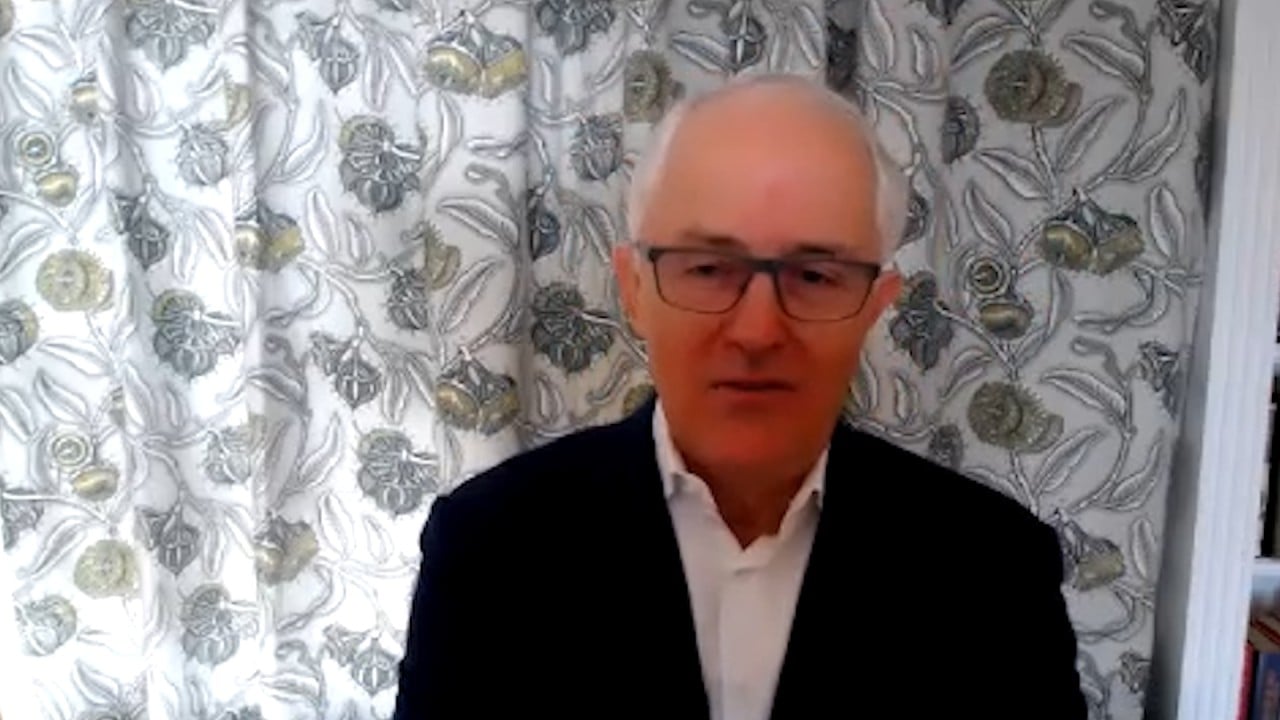
China-Australia relations: ex-PM Malcolm Turnbull urges Canberra not to ‘buckle under pressure’ from Beijing
- Former Australian prime minister Malcolm Turnbull says Australia ‘will get less respect’ if it tones down its criticism of China
- The Turnbull government banned Huawei and ZTE from Australia’s 5G network, seen by some as a tipping point in bilateral ties between Beijing and Canberra
Australia should not “buckle under pressure” from an onslaught of trade actions from Beijing and change its stance on controversial bilateral issues with China, according to former prime minister Malcolm Turnbull.
I went through an episode precisely like this in 2017 and 2018. And we stuck to our position, we didn‘t succumb to the pressure
Turnbull was prime minister between 2015 and 2018, when political relations with China began to sour, even as commerce soared following the signing of a bilateral free trade deal in 2015.
“I went through an episode precisely like this in 2017 and 2018. And we stuck to our position, we didn’t succumb to the pressure. And once it was apparent in Beijing that the pressure was not producing the result they wanted, it dropped off. So I think you just have to stand your ground,” said Turnbull.
During Turnbull’s tenure, Beijing lashed out at Canberra due to Australia siding with an international tribunal’s decision that China had no historical claim to disputed South China Sea islands, the banning of Huawei Technologies Co. and ZTE from Australia’s 5G network, and Turnbull’s introduction of foreign interference laws seen as targeting Chinese influence in Australian politics.
In recent days, a series of Chinese government officials have said Australia needs to make the first move in repairing the bilateral relationship, which has frayed since Australia led calls in April for an international inquiry into the source of the coronavirus.
The one thing you cannot do with Beijing or any other superpower is become sycophantic or to demonstrate that you will just buckle whenever the pressure is ratcheted up, you get no thanks for it – you get less respect
But Turnbull rejected such calls, encouraging his successors in government to “stand firm”.
“The one thing you cannot do with Beijing or any other superpower is become sycophantic or to demonstrate that you will just buckle whenever the pressure is ratcheted up, you get no thanks for it – you get less respect,” said Turnbull, who was speaking at a Peterson Institute for International Economics webinar on Friday.
Australia has also been heavily reliant on Chinese money flowing into its tourism and education sectors. After the Chinese Ministry of Culture and Tourism issued a travel alert for Australia due to a “significant increase” in racist attacks on “Chinese and Asian people”, it is unclear whether this will recover if and when coronavirus travel restrictions are lifted.
“The pressure that we’re seeing at the moment appears to be bigger than it actually is. I mean trade volumes overall are still increasing. These sorts of action, whether it’s trade action like that or furious editorials in the Global Times or People’s Daily, are all instrumental, they’re designed to achieve a certain response, which in our case is compliance,” Turnbull added.
“I don’t think that the pressure we’re seeing on trade with China at the moment is going to be an enduring one, it’s thoroughly instrumental. At some point our friends in Beijing will recognise the pressure is not going to produce a result, so it will go back to business as usual, I hope.”
Turnbull said that the episodes showed the need for Australia to diversify its trading relationships and expand its existing network of free trade deals.
But Turnbull played down the significance of the accord, since it mainly deals with tariff reduction and Australia already has trade deals with many of the other RCEP member nations.

00:59
China's ‘wolf warrior’ diplomacy counterproductive, says former Australian PM Turnbull
“There’ll be some hoopla about the [RCEP] signing, and you know the entry into force. I mean it is a really low-ambition trade deal that we shouldn’t kid ourselves on, it’s a very old fashioned trade deal, it’s low ambition. It’s been affected largely for strategic reasons,” Turnbull said, adding that while China joining CPTPP in the future would be a positive development, he did not see it as being a realistic option.
“I’d certainly want to seek China’s involvement, I don’t think it would be damaging, and if China and the US joined it would be really extraordinary now,” he said, but added that China’s compliance with the terms of the accord would be “the inhibitor”.

